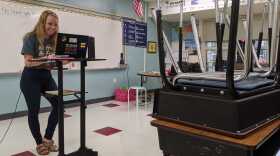Southeast of Raleigh, two neighboring counties – Wayne and Johnston – both saw recent rises in COVID-19 cases. Both school districts had been operating in Plan B, with students rotating into schools for in-person class. Then last week, the Wayne County school board voted to move its youngest students to in-school Plan A in January, while the Johnston County school board opted to move all its students to all-online Plan C until January.
Two neighboring school boards, in two days, went in completely different directions.
The decisions by the Wayne and Johnston County school boards highlight the patchwork nature of school reopening plans across the state.
In Johnston County, the board's vote was decisive, but not unanimous. By a 5-to-2 margin, the board decided to go all-remote until mid-January, to put a pause on in-person learning while COVID-19 cases in the community have been sending an increasing number of students and teachers into quarantine.
One of the two "opposed" votes was cast by Board member Ronald Johnson, who expressed concern that virtual learning doesn't work for everyone.
"If you are a student or family and you want to be in school, and you're a teacher, and you want to teach and you want to be in school, I believe that you have that right," Johnson said.
The state health department has labeled Johnston County red on the county alert system, indicating "critical community spread." Wayne County is labeled orange, for "substantial community spread" ― yet their school board voted the opposite way. Also in a 5-to-2 vote, that board chose to take up Gov. Roy Cooper on his October order allowing K-5 students to return to full-time in-person class.
Duke University pediatric epidemiologist Dr. Ibukun Akinboyo says neither choice is wrong.
"Allowing options so that local boards can make local decisions, or local school leaders can make local decisions, I think would be the best approach as we go into the next few months," Akinboyo said.
Akinboyo has been part of Duke University's ABC Science Collaborative, which has been advising North Carolina schools as they weigh those options.
"I know it's hard to flip back and forth and see decisions that are flipping back and forth," Akinboyo said. "But I think with my newer lens into the school setting, and what schools have to deal with, I've been floored by how many perspectives have to be considered when trying to make a decision for schools."
Akinboyo says it's good for school boards to take in those perspectives and local data. Community spread is one factor, but it's not the only one. It also matters how the local hospital is doing and whether quarantine rates are affecting school staffing.
"Is the public health system overwhelmed? Or can they help you with (contact) tracing?" Akinboyo explains. "Do you have resources in your school setting? Do you have staff that can come in?"
Akinboyo says she's studied the data on COVID spread in North Carolina schools, and as of now, it shows that as long as schools follow protocol for social distancing, masking and hand washing they have proven to be safe, even if cases from the community arrive at their doorstep.
"We within communities need to focus our efforts on reducing our rates, and we can all do that, regardless of if the school is open or not," Akinboyo said.
She says she'll keep an eye on the data as these decisions play out.










